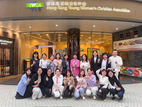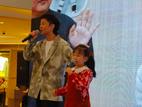Having difficulty in writing and using Chinese, the earliest missionaries to China needed the assistance of Chinese people in learning Chinese and its culture, especially in biblical translations into the language. Therefore, the main role of Chinese people was to teach them Chinese and assist them in translation.
At that time, foreign missionaries dictated the biblical translations or gave the draft translations that were polished by their assistants. In the era without printing, Chinese literati also needed to transcribe and proofread the translations.
After the Mandarin Union Version was published in 1919, Wang Xuanchen or Wang Yuande, a scholar from Shandong, was the first Chinese person who translated the Bible into Chinese on his own, marking the transition of Chinese "assisting" role.
In 1918, an article published in the Chinese Recorder and Missionary Journal said that Chinese people who appeared to be passive in Chinese Bible translations only made two attempts to translate the Bible into Chinese. They were He Jinshan(何进善,1817-1871), the first Chinese Protestant theologian who wrote biblical commentaries, and Yan Fu, the first one who translated parts of the Bible into Chinese by himself.
Now let's get a closer look at the theologian - He Jinshan.
Born in Nanhai County, Guangdong, He Jinshan (1817-1871) lived with his father in his childhood in Malacca, Malaysia. He studied in a school founded by the London Missionary Society and became a Christian. He became the first Chinese pastor in Hong Kong in 1846, marked as the second Chinese Protestant pastor after Liang Fa.
He studied from the London Missionary Society missionary James Legge in Ying Wa College in Malacca, known as one of Legge's favorite protégés. Legge taught him western cultural knowledge especially history, Hebrew, and Greek, and also expounded the Bible and various kinds of theological works to him. He, a great learner with talents, could read the Hebrew and Greek Bible fluently and even write in Hebrew prior to his graduation.
He annotated some parts of the Bible, which was marked as the first move at a Protestant Bible translation done by a Chinese person. The Gospels of Matthew and Mark, translated and furnished with commentaries by He were published in Hong Kong in 1854 and 1856, respectively. In the two books, he translated the word God into "Shangdi" and interpreted Christian doctrines with Confucianism. He was also involved in the translation of Chinese classics with James Legge.
Their works included the first volume of the Chinese classics containing the Analects of Confucius, the Great Learning, and the Doctrine of the Mean.
He was also a prolific religious author. His religious writings included commentaries on Matthew, Mark, and the Ten Commandments, and the Bible that had an exponential impact on biblical commentaries. He often published articles on the newspaper, like an essay in the Chinese Serial that gave a systematic introduction and evaluation of the Old Testament and the New Testament.
(The author is a postgraduate of College of Liberal Arts, Shanghai University.)
- Translated by Karen Luo












